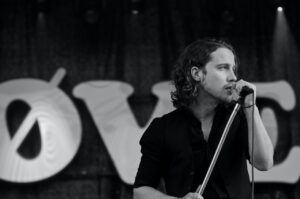Yes, that is the question. What can a singer do that makes them sound so great, so emotional, so passionate, and touches the soul so much? Not everyone is born with a voice that is of star quality. A lot start out with a good (maybe even better than good; perhaps great) sound that is always on pitch, has great tonal quality, and is emotional. If you are one of them, chances are you’ve been told you could make a decent living at it, maybe even become a star — and the suggestion would be to take some voice lessons.
I was born with a natural opera voice, a great big one. I always loved to sing. I never thought about pitch or even how I sounded. I sang for the sheer joy of singing. I didn’t know my voice was that special until I was in the 8th grade. Choir was a requirement then and it was the choir teacher who took notice as soon as I started singing. She was in awe of my singing voice and so were all my fellow classmates. I was instantly singled out and became the choir’s soloist whenever a song required one. She purposely chose quite a few of those and gave me voice lessons after school to further improve my voice.
I grew up in a city full of entertainers and people in the entertainment industry; with friends who were the daughters and sons of those people. After our first choir performance, the audience had been taken by surprise and I got a standing ovation. My parents were equally surprised because I never sang when they were around. At 12 years old, I was just a kid whose voice had never failed her. I never cared that much about how good I was. I only knew I loved to sing and loved the attention I started getting for it.
Elementary school went from kindergarten to the 8th grade; high school from 9 to 12. There were four elementary schools in the district and, once in high school, everyone from all four attended. Now there were lots of good singers, great ones, and stellar ones. You had to audition for the choir into which I was accepted. The choir consisted of an age range between 14 and 18 years old. There were times when I was singled out for a solo, but there were also many other singers who got to sing solos as well.
Because all those entertainment industry people thought I had such talent, they pressured my parents into paying for voice lessons. I took with two teachers, one was the choir’s director and the other was her teacher. Those two worked especially hard with me on all the songs we sang that came from operettas. I didn’t learn much about any special technique back then. Mostly they worked with me on how to sing those songs well and reach the highest notes with ease. There was not a lot of emphasis on developing my voice more. For that, I needed to be able to comprehend the scientific principles they used. So at 14 years old, they felt I was still too young for that and stuck to the basics.
Once I went to college, I sang for myself only. I hadn’t auditioned for entry into the music school’s program of studies. In essence, I left singing behind. Once out of college, I worked in a few different business industries. The last job I had before becoming a voice teacher was in public relations. I hated that job so much (always on deadline and very stressful because of it) that I found myself very unhappy and sick to death of working in any industry that had nothing to do with the arts. I had to do something that would bring some joy back into my life. Since I still loved singing I decided to join a choir.
At my first practice, my voice stood out big time. I joined completely unaware that the choir director had been in a band with many albums and singles that went to gold and platinum. After that practice, he walked me to my car. He asked if I was in the industry and when I told him I was not, he wanted to know why. We went for coffee and during the course of that conversation, I told him how badly I wanted to return to the arts but had no idea where to turn, which direction to take, or how.
He suggested I start with voice lessons again. So I called my old voice teacher from high school hoping she was still teaching. She was now in her 70s. After that first lesson (although she said it would take a lot of hard dedicated work and real commitment) she wanted me to become her protégé. That meant learning everything I could about how to develop a voice and bring the instrument to its full potential using her technique.
As luck or fate would have it, things worked out in such a way that I could spend every afternoon at my teacher’s house while she taught many students ranging from beginners to pros. She was booked from to 9 am – 6 pm every day except Sundays and also had a long waiting list of singers wanting to jump on board. I arrived every day at 1 pm with a notepad and pen in hand. As she taught, she encouraged me to interrupt and ask questions. My private lessons working on my own voice were on Saturdays and I learned a ton about what makes a good singer, a great one, even a star.
The first thing to know was that good singers need a well-developed instrument. That meant lessons spent mostly on vocal exercises designed to fix pitch problems, increase range, learn how the instrument should be working (which also meant learning about those scientific principles), and how to sing with more freedom and ease. I very quickly learned how important it was for the singer to understand what made their singing right when it was right and wrong when it was wrong. My teacher was loaded with visual aids to help show the student what they’d done when it was right and what happened to the instrument when it was wrong.
I recorded every single one of my private lessons and on playback, I learned how to feel what my body was doing and learned it with my ears — which turned out to be a huge gift discovered once I started my own career. I also possessed the ability to communicate clearly which helped tremendously when directing a student into precisely how to work through their weak spots. Vocal exercising takes a lot of hard work and concentration — BUT — if you don’t give up trying to “get” it no matter what, your voice will grow in unimaginable ways. Every singer wanting to learn how to sing, sing well, better, or great, needs to practice the vocal exercises A LOT.
Secondly, it is imperative to learn how to move away from the “oh so technical” learned through vocal exercising and turn it around to learn how to sing songs with ease, freedom, emotion, and passion without the worry of what you sound like (which is a focus when learning technique to develop your voice). If you don’t, your singing will come off too mechanical and academic. No one will get anything more from you as a singer other than a voice that sounds good.
Your job as a performing artist is to move your audience, touch their hearts, and permit those people to feel their feelings through everything you’ve got to give and bring to any given song.
This means learning techniques to help get you into the story content of songs. Those techniques include learning which consonants to lean on, which ones to drop and how to use them to propel the sound out on open vowels. Consonant work helps you focus more on the words and with that kind of focus, there will be an automatic response to those words. Feelings will come in. Additionally, you’ll need to learn how to use the mouth and how to get into mask placement. All three of these things working together will have you singing without the worry of how you sound. Instead, you’ll be free to sing your heart out.
Your fans become fans because they identify with your interpretation of a song, its story, and how passionate you are about it. Your emotions will carry you from one phrase to the next throughout a song. Once connected emotionally, and with added style and artistry, that’s when all that vocal exercising you’ve done to develop and strengthen your voice kicks in. It is the combination of both vocal exercising and song singing techniques that turns a singer into a good one, an even better one, a great one, or into a star.

